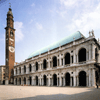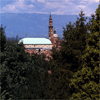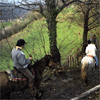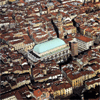|
|
|
Vicenza Guide Italy
|
 |
 |
 |
 |
| Piazza dei Signori |
A view of the Basilica Palladiana |
The countryside |
The historical centre |
Directories of Web Sites:
Vicenza Italy
Vicenza Hotels
Vicenza Guide
The origins of Vicenza reach back into distant epochs. The Paleoveneti settled there some centuries before Christ, as can be seen from the archeological finds. During the period of Roman domination, the city was organized as a "castrum". In Piazza Duomo, under Palazzetto Proti, the "Roman Cryptoporticus", part of an ancient patrician house, may be visited.
The early Middle Ages saw Vicenza become the seat of a Lombard dukedom and in 899 the city was destroyed by barbarian invaders. It was after this that the inner circle of walls that encloses the urban centre was built. In the 13th Century Ezzelino III of Romano, known as "The Tyrant", successfully took posession of a large territory and Vicenza became the centre of his seigniory. On Ezzelino's death, in 1259, Padua extended its dominion over part of our province until the Scaligeri took over at the beginning of the 14th Century. At the beginning of the 15th Century, after a brief period under the Visconti's, Vicenza agreed to join the "Serenissima", the Republic of St. Mark, and remained part of it until Napoleon brought to an end the centuries-old history of the Venetian state, in 1797. In the course of the three "Venetian" centuries, Vicenza was transformed, it acquired architectural riches and became on of the major artistic center of Italy.
In December 1994, Vicenza - the City of Palladio - was included in the UNESCO's World Heritage list in recognition that its Palladian architectural treasures are to be considered of exceptional interest and of universal value. Andrea di Pietro della Gondola, known as Andrea Palladio , (Padua 1508 - Maser 1580), was beyond a shadow of doubt on of the greatest Italian architects of the 16th century. From about 1540 to the day of his death he created imposing civic buildings and transformed the appearence of Vicenza. Palladio was attentive to the lessons to be learned from the ancients, and he undertook three journeys to Rome to improve his knowledge of the classical world and assisted in the publication of Vitruvius' treatise "De architectura". Strolling around the city one can admire his public buildings, the Palladian Basilica and the "Loggia del Capitaniato", and the aristocratic rediecnes of the Porto, Barbaran and Thiene families. Two indispensable stops for those waiting to appreciate Palladio's achievement are the Villa Capra, know as "La Rotonda", so dear to Goethe and to the film director Joseph Losey, and the Teatro Olimpico, his last work.
The territory that makes up the province preserves an extraordinary treasure: hundreds of Villas that mark centuries of Venetian culture. Almost all of the country residences designed by Andrea Palladio are to be found in our contryside: Villa Godi Malinverni, Villa Vamarana Bressan, Villa Da Porto Predrotti, Villa Caldogno and many others besides. The Venetian-Gothic buildings of the 15th Century are as interesting as the large 18th Century complexes. Giambattista Tiepolo was responsible for three cycles of sublime frescoes: those from 1734 in Villa Loschi-Motterle, the 1743 Montecchio cycle in the house designed by Giorgio Massari for Carlo Cordellina, and those in Villa Valmarana "dei Nani" (of the dwarfs) from 1757.
Vicenza is the city of Gold. Every year three international trade fairs are organized, in January, June and September, attracting thousands of people from all over the world. The Vicenza Province is one of the main centres in Italy for the working of this precious metal.
Not far from Vicenza there is Bassano del Grappa, a floursighing economic and cultural centre on the River Brenta. The houses and edifices, often frescoed on the outside walls, remind the visitor of the city's traditional role as a place of trade and production, acting for centuries as an intermediary between Venice and the world of Germanic empires. Bassano del Grappa's "Wooden Bridge" is the symbol of the city. The structure, rebuilt after the Second World War, was conceived by Andrea Palladio.
To the north of Vicenza lie Marostica and Nove, the cities of Cherries, Chess and Ceramics. The production of ceramics is one of the arts that has been present for centuries in Bassano and at Nove. One of the biggest and most renowned workshops of the 18th Century was that of the Antonibons. In 1712, Giovanni Battista Antonibon joined forces with Giovanni Battista Moretto to produce plates and vases, an activity the Morettos had already begun in 1683 at Angarano. They opens outlets inVenice, Trento, Mantua, Ancona, Pesaro and their products reached Austria, Germany and even Constantinople. Today the area of Bassano and Nove are still famous for their ceramic workshops. At Marostica it is possible to find some of the most famous italian cherries. To the North-West of Vicenza there is Recoaro Terme, a well known Spa that has been a centre for relaxing and therapeutic holidays from the time of the Serenissima Republic of Venice. The curative powers of the waters are of particular value for treating problems of the digestive and of the urinary apparatus, those due to iron deficiency, and liver conditions. Other places that are worth a visit are Schio, one of the most important sites of industrial archaeology in Italy; Lonigo chosen as their home by the Pisani family and full of architectural masterpieces.
(Part of the Contents and the Images are gently given by APT Vicenza) |
|
|
|
Acquista la tua visibilità su Travel Plan
|
|
|
|